This post will be a bit different from my typical trail journal, since I feel compelled to use it to teach as much as inspire. It is in no way meant to belittle the choices that were made by these boys or their mentors (and their names and the school they’re associated are not disclosed, although I will be reaching out to the school in hopes of volunteering my time to provide some basic outdoor education to the staff). They undoubtedly learned volumes from an experience that could have cost two kids their lives.
My trail journal will relay the story of what happened first. As you read, I encourage you to take mental notes of when you think different choices would have served them better. Most importantly, if you’re unsure, please read to the end for my own thoughts, based on both extensive experience and my time as a search and rescue team member.
Trail Journal
The day starts with a forecast for rain, wind, and highs only reaching the lower 40’s–conditions that make it awfully hard to leave my warm bed, cocooned between my husband and dog, who snuck in during the night and laid her head right next to mine on my pillow.
I finally tear myself away leaving a bit later than anticipated, still not sure I’m making the right decision but knowing I’ll be thankful once I’m finished (especially when the alternative is tackling a mountain of housework I’m neglecting).
My hike starts in drizzly conditions and I look out at the grey, dreary ridge to my west, the clouds hugging it tightly, as if to say, “hang on for the ride ‘cuz it’s gonna get ugly.” For now though, it offers a monochromatic beauty that fits my mood.
It’s two weeks away from the 10-year anniversary of my mother’s death. Every year, the weeks leading up to the actual day are harder for me than the day itself. Her last few weeks of life were a living hell, and I find myself revisiting them in vivid detail in my memory as I hike along.
Unexpectedly and abruptly, I find myself spiraling into a dark place of emotional pain I don’t allow myself to visit often, crying as I hike, saying aloud, “Why the hell did you have to take her so violently?! Didn’t she suffer enough knowing she was going to die before she was even 60 years old?”
I never get an answer to this absurdly rhetorical question. Cancer is impartial. But today, I’m offered something better when I hear her gentle voice telling me, “I’m okay now and you’re okay too. Just continue to use this pain as fuel to do good things and it keeps me alive.”
I wipe my tears with my sleeve and say back to her, “I’m trying, Mama, and I will. I just miss you so much and thought it would be easier by now.” She reminds me, “To be human is to suffer. Embrace it and use it for good.”
I hike on and do my best to focus my attention on the miracles of the forest floor as I hike, taking photos of several scenes that catch my eye. It distracts me from my grief and I even find myself being silly with a timed photo while I’m studying an enormous tree that’s fallen across the trail, figuring out a strategy to get around it. All of this helps, and I feel as if I’ve hit the reset button on my mood just as a cold mixed precipitation begins in earnest.
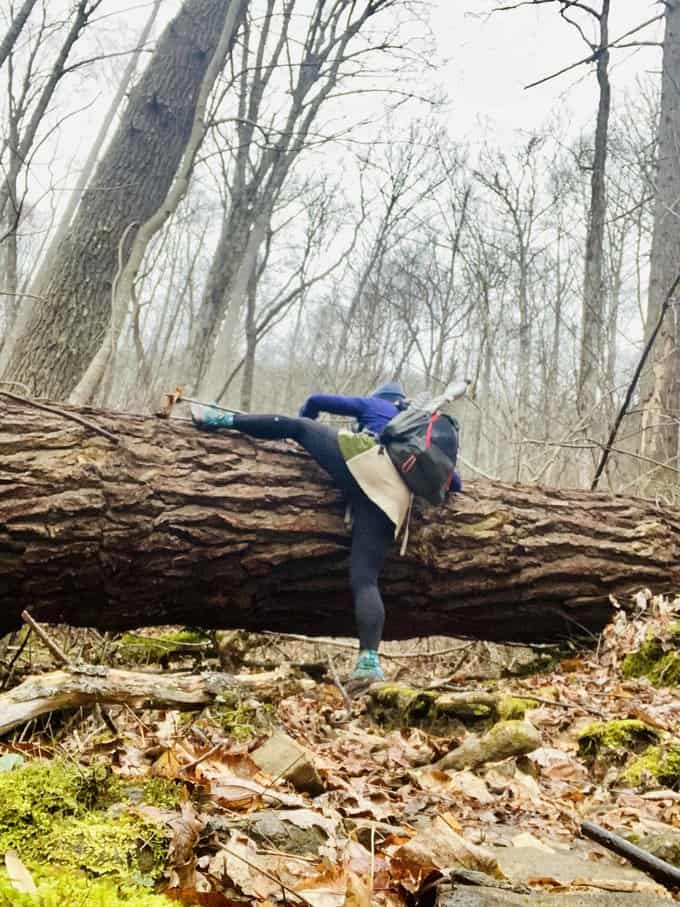
This photo was only for fun–I ended up climbing over it in a different spot!

I came across lots of oak galls along the hike.
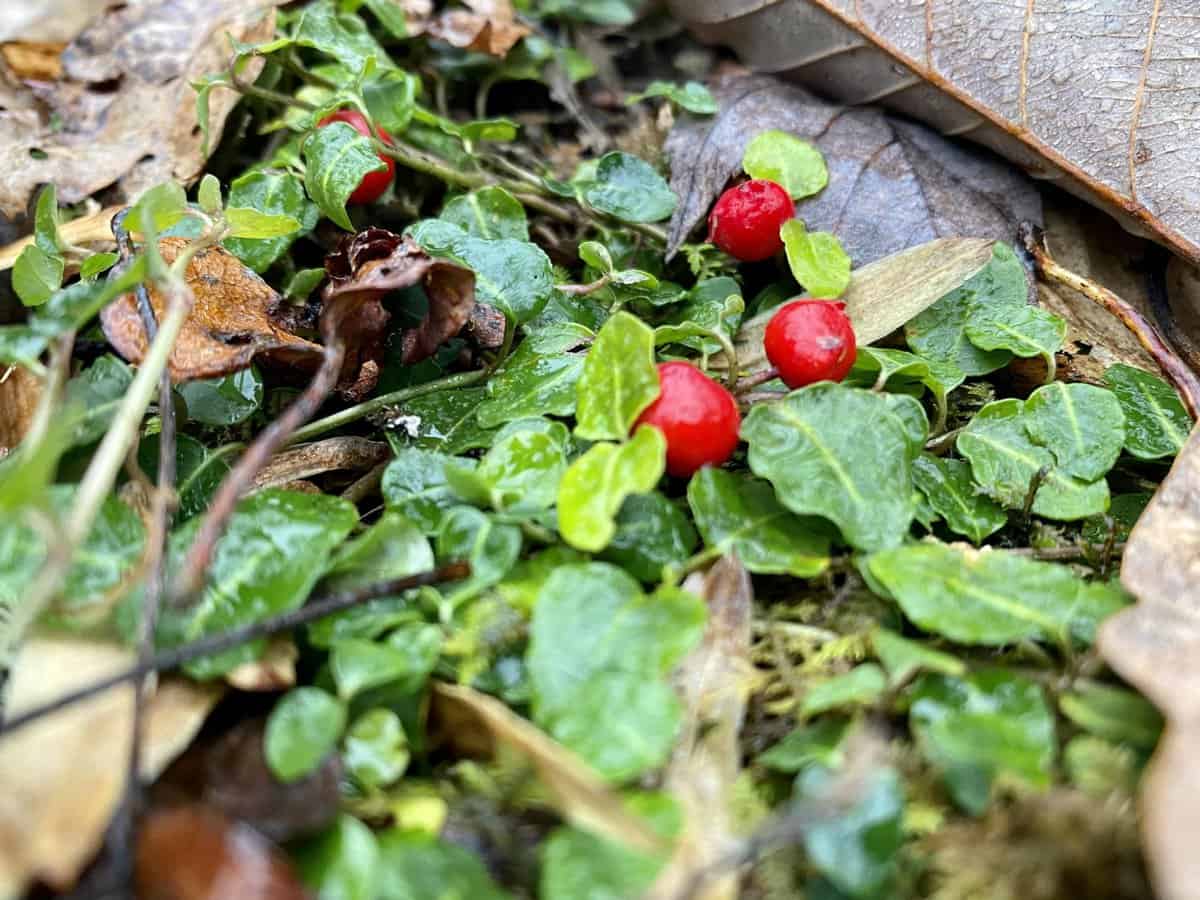
Partridge Berries are so simple but so beautiful.
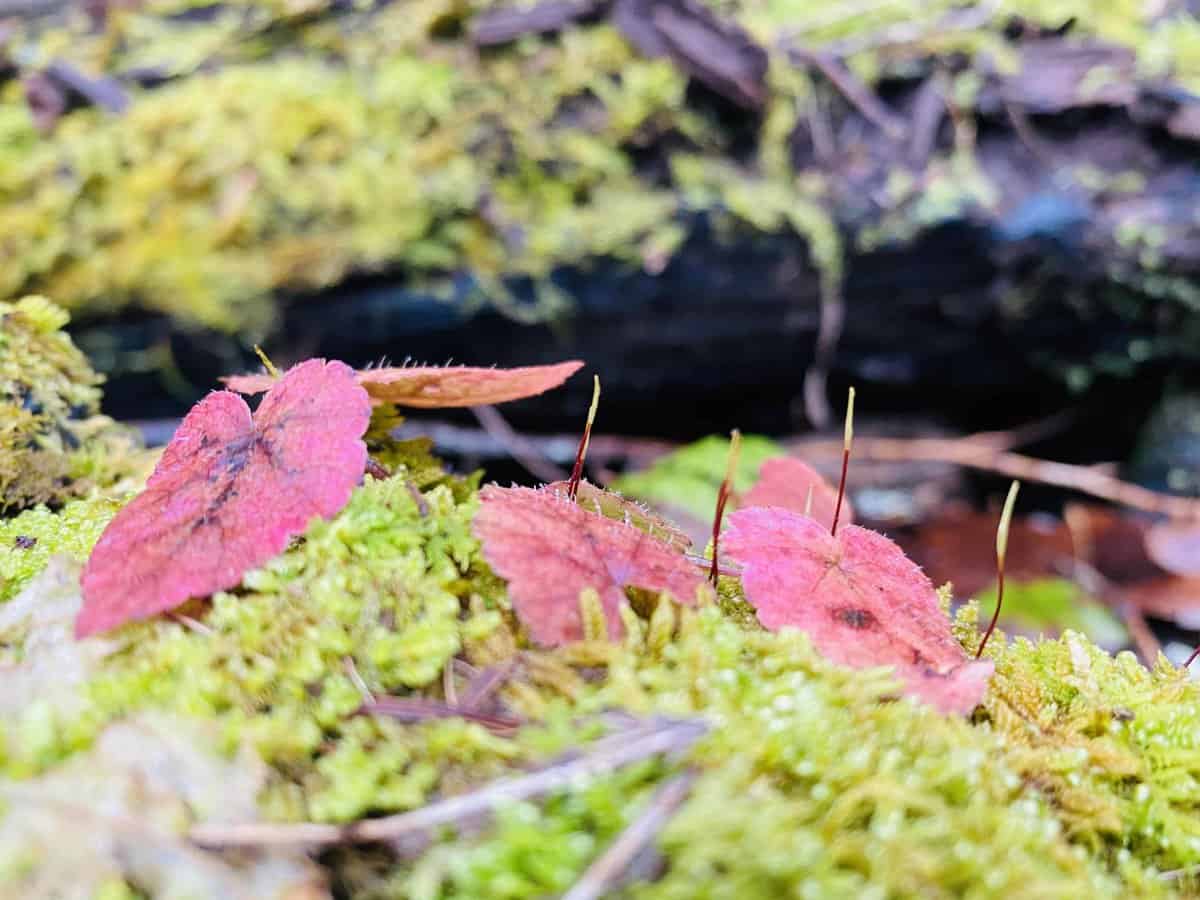
No one should ever say the colors of the forest aren’t vibrant in winter.
I pull out my umbrella and it’s enough protection as I continue to climb. Eventually, I start my long downhill descent on Thomas Divide Trail, and I bomb down the trail as fast as I can safely hike in the rain. It’s not enough to ward off the cold temperature though, and I know I need to stop and put on additional layers before I get too cold. Just as I’m about to do this, I see two hikers in the distance, walking quickly towards me in the opposite direction on the trail.
Before they even get to me, I hear them calling, “Hey! Do you know where you are?! Can you help us figure out how to get out of here?!” They are both drenched and have nothing on them except predominantly cotton clothing, including shorts and jeans.
I quickly learn they are teens, ages 15 and 17, and are out for a hike with a school group. Their short loop hike was supposed to pass three waterfalls near the Deep Creek trailhead. These two boys ran ahead of the other 5 students and their two 20ish-year-old mentors. Now, miles later from where they last were with the group, they are lost, scared, and hypothermic.
As I’m asking them questions, I’m instructing the one who is only wearing cotton and shivering to take off his shirt and put my rain jacket on. He doesn’t flinch at donning a bright pink jacket, but he needs help with the zipper because his hands have lost all fine motor function from the cold. I give the other boy my rain wrap, instructing him to put it around his shoulders as a makeshift poncho.
At this point, I’m not entirely sure which trails they’ve traversed to get to this point, or even where the rest of their group might be. They relay to me that the group was having trouble finding Indian Creek Falls, and they think they might have gone up the wrong trail to find them (they did). They told their mentors that they wanted to run ahead a little on the trail and that they’d stop at the falls to wait for everyone else, once they found them.
A quick glance at my map leaves me with two choices: Backtrack in the direction they came from to the Deep Creek trailhead and hope we come across their group; or take a route with a similar distance back to my car and drive them down to Deep Creek trailhead, with hopes that their group is safely off trail and is there waiting for them.
I opt for the latter, since I don’t want to arrive at Deep Creek trailhead and find a locked school van with no one in it, which would necessitate a long walk up a dirt road to my car. These boys need to be out of the elements as quickly as our feet will take us to my car.
We set out and thankfully they’re in good physical shape to keep an efficient pace walking uphill. But I can tell they’re hurting more as the miles tick by (we have to hike about 4 miles to get back to my car). Despite my efforts to keep them dry, they’re still cold from their soaked jeans and shorts and the rain isn’t letting up.
The boy in shorts starts to trip frequently because he can’t feel his numb legs. His legs are bright red with cold as are the younger boy’s hands. He can barely even hold my water bottle to take a drink when I offer it to them. I put my spare socks on his hands, but they quickly become soaked and cold too (my gloves got drenched when I was scrambling to get rain gear on them at our initial encounter, or else I would have given them to him).
As we hike, I try to keep their minds off being cold and miserable. Thankfully, they are both fueled with a healthy dose of optimism now, since the lady with hiking poles has come to their rescue (they tell me that they knew I must be a knowledgeable hiker since I had hiking poles). 😉
Despite the fact that they still aren’t nearly as protected from the elements as they should be, even sharing my rain gear (I am still using my umbrella to cover me and the younger one as best as I can), I know the best course of action is to keep them moving towards the car. To stop, build a fire in the rain, and set up my tarp shelter would be a time consuming (and challenging) endeavor; however, I constantly scan the landscape around me to look for a semi-protected place to do it, if one of them can’t continue walking.
I tell them that I’m on a search and rescue team that helps with SAR efforts on the North Carolina side of the park, and if my phone starts squawking with a strange alarm when we’re back in a zone of cell reception, it will likely be them my team is being dispatched for. I plan to call emergency services as soon as I have a signal, hoping the mentors have already called to alert them. This would be a very urgent search effort, given the weather conditions and the boys’ lack of gear and proper clothing.
A question looming in my mind is if the mentors and the other 5 students are just as lost as these two boys. They relay to me that the rest of the students and mentors are equally unprepared as they are for the weather conditions, which doesn’t make me feel any better about the prospect.
As we walk, I ask them more questions about the trails they hiked before they found me. They explain that after they broke off from their group, they reached a trail junction and took a right onto the “Loop Trail,” since they knew they were supposed to be hiking a loop route.
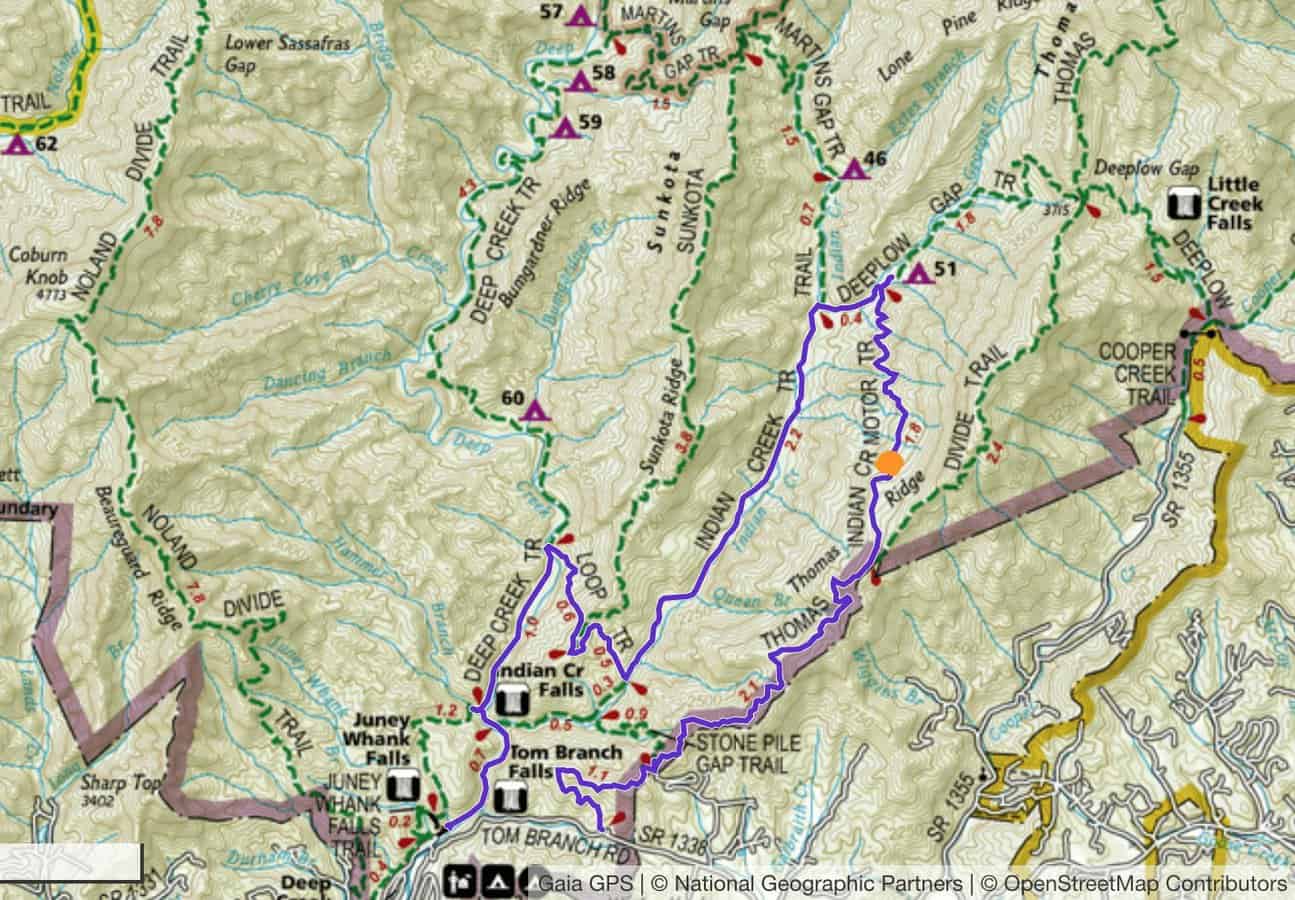
The purple line is the route the boys took, with the orange dot representing where I came across them on the trail. At the point of the orange dot, we hiked south on Indian Creek Motor Tr. to finish on Thomas Divide, ending at Tom Branch Rd. where my car was parked.
When they arrive at the next trail junction they decide they must be close to the falls, since surely Indian Creek Falls will be on a trail with the same name; however, they take a left onto Indian Creek Trail and continue on (if they had taken a right, it would have indeed put them in front of the falls and much closer to the trailhead).
A little over 2 miles later, they reach the junction of Deeplow Gap and Martins Gap Trails, and the trail sign reads that Indian Creek Motor Trail is 0.4 miles ahead. Sounds logical, they think. Surely that’s where the elusive falls are hiding. And even if the falls aren’t there, the trail name has “motor” in it, and they suspect they might encounter warm cars with drivers that will bring them to safety.
By this point though, their inner voice is telling them that they’ve made poor choices and they’ve wandered way off course, while recognizing the rest of their group would never have hiked this far. But they’ve become panicky from being wet and cold with the constant rain that isn’t letting up. So they continue on versus backtracking, thinking this will be the shortest route to safety. Indian Creek Motor Trail is where I encounter them.
When we reach the junction of Indian Creek Motor Trail and Thomas Divide Trail, which is the next trail junction they would have encountered had they not come across me, I question which way they think they would have gone. They both look at each other and say, “To the left, up this way.”
This choice would have put them even deeper into the backcountry, further out of the radius of civilization and from where they started the hike. When I ask them why that would be their choice, they tell me, “Because it would take us up higher, so we might be able to see where we should have gone. Before we met you, we were actually wondering if getting off the trail to get to a higher spot to see more would be a good idea.” The younger one tells me, “I was on the verge of just giving up though, I was so tired from how far we’d already hiked.”
After what feels like forever and nearly 4 miles later, we finally reach my car and they dive inside, thankful for the heat I immediately crank up to warm their shivering bodies. I offer them my stash of snacks I keep in the car for my kids, and they gratefully consume it.
We drive to Deep Creek trailhead and my stomach lurches when I see the school van with no one in it. Hours have passed since this group started their hike, not a single one of them properly prepared for a hike, much less one that involves rain in nearly freezing temperatures.
Thankfully, I have cell reception and call 911. I’m connected to the park and relay an abbreviated version of the story. I release an audible sigh of relief when I hear that the mentors have indeed contacted emergency services to notify them of the missing boys and that they are still on the trail, in good enough shape to hike out on their own. I’m instructed to wait with the boys in my van until they arrive, but they are at least an hour out.
After we hang up, the boys give me the phone number of one of the mentors and I call it, hoping maybe they have a pocket of reception. I want to see if they’d like me to bring my gear up to them, to at least give the ones in the worst shape some form of protection against the slippery slope of worsening hypothermia. She answers. I ask her if she’s certain that she knows her way out and she tells me, “Yes, I’m just following Google Maps so I think we’ll be okay.”
The boys are surprisingly knowledgeable about outdoor survival skills. One of them has even successfully made and started a fire with a bow drill. They have extensive experience in the backcountry and I’m shocked to hear how much they know about hypothermia and how quickly it can escalate. They are really interesting and despite the crazy circumstances that brought them into my life, I’m inspired by some of the things I sense they’ve been through in their lives and their resiliency.
An hour and a half passes and I’m doing my best to not relay to the boys my growing concern about the rest of their group. As I’m picking up my phone to call the mentor again, one of the boys says, “I see them! They’re here!”
Five completely soaked teens and the two mentors, visibly exhausted and freezing, wearily walk towards the school van. A couple of them are having incredible difficulty even getting their legs to make the step up into the vehicle, because of how cold they are.
I ask the mentors if they need help driving, since I know they are equally as cold and tired. They decline but thank me for helping. The two boys I’ve helped thank me again, and the mother in me is fighting back tears, thinking of how different their fate might have been had I not come across them.
I drive off towards home, still processing everything. I’m equally relieved and flabbergasted, reflecting on a cascade of events that could have easily led to deadly consequences. It’s sobering to think of what could have happened to these boys, had I not crawled out of my warm bed to hike.
There are few times in my life when I feel like my mother’s spirit takes my hand and directly leads me somewhere, to prove she’s right there by my side at all times. But today, she did just that, and I’m forever grateful for the ongoing gift of her guidance and love in my life. And I’m especially thankful that two special boys woke up this morning to see another day.
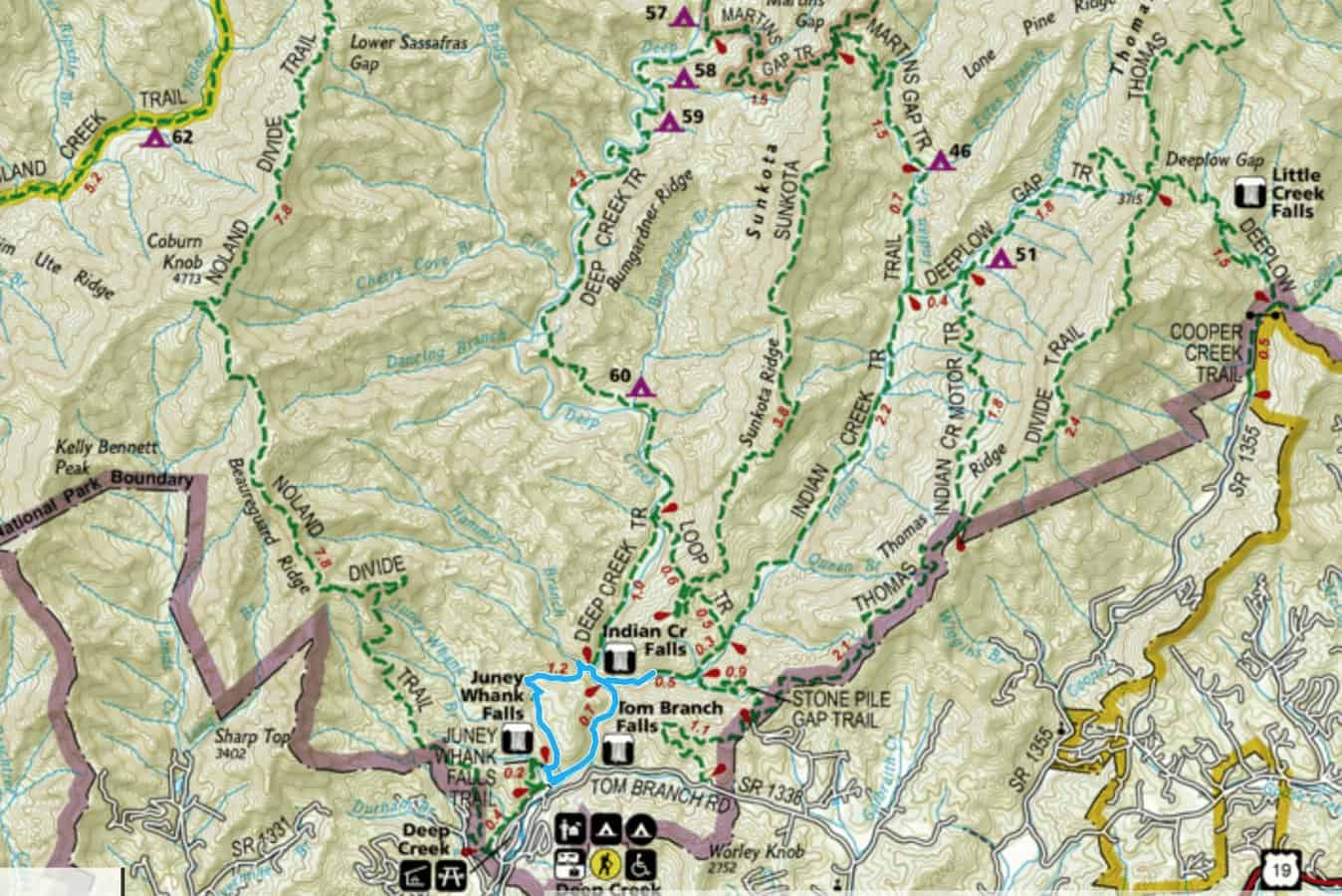
In contrast to the map I shared previously, this one shows the route the boys planned to take that morning (the blue line)–big difference!
Lessons Learned
If you’ve read this far, I hope you have a mental list of the lessons learned from this experience. I will share my own thoughts below, but this is certainly not an exhaustive list and I would love for you to add a comment below, if you have thoughts to add.
Also, every scenario is different. Sometimes there are unknowns with which choice will yield the best result. I will offer my own thoughts and opinions, but it doesn’t mean they are the only choice that would lead to a favorable outcome. The important thing to remember is that the most valuable piece of gear on a any hike is what you carry between your ears.
Finally, below this list is a list of what I feel these boys did well in their predicament. While there were plenty of blunders, they also made some sound decisions that helped them out of their bind.
At the very end of this post, I will offer some additional information to learn more about what I write about.
1. At a minimum, the mentors should have come prepared with the 10 Essentials. Because they thought they were hiking a very short loop, they neglected to bring a single thing, thinking they’d finish before the rain started. No matter the distance, popularity, or experience you have, always come prepared on a hike.
2. Every member of the group should have had proper hiking attire on, with absolutely no cotton on their bodies. They all should have had their own personal rain gear and water bottles.
3. The mentors should not have relied on technology as their sole tool for navigation. Even if they had just carried the $1 map from any visitor’s center, they probably would have avoided the turnoff down the wrong trail that led to the cascade of events they found themselves in. In addition, in my opinion, Google Maps is not a sufficient means of digital navigation (my personal preference and favorite is Gaia GPS).
4. At a minimum, the boys should have been counseled before heading out on the hike, to wait at any trail junction for the rest of the group to catch up.
One of my fellow SAR team members who now knows this story feels strongly that groups like this should stay together at all times. In this particular scenario, I agree, since it would have prevented everything that unfolded and because they were all so unprepared to mitigate anything that happened to them.
However, my own comfort level with groups splitting up isn’t always black and white. To me, it depends on the person and people hiking, regardless if they are adults or older teens (younger kids should definitely stay with adults at all times).
How well prepared the individuals are with both with gear and knowledge to conduct themselves responsibly, and mitigate any issues they might face, is the determining factor if I think a group should stay together constantly or if it’s okay to space out a little. But for groups involving minors of any age, especially school groups, it’s probably best to always have each kid in your sight.
5. At some point, the boys should have stopped and thought about their situation more logically, especially when their inner voice was telling them they were making poor choices.
The importance of the acronym STOP cannot be overstated in this situation: Stop, Think, Observe, and Plan. They were able to accurately and quickly tell me the exact order of trails they had hiked before they came across me, which means they could have stopped much sooner than when they reached me, and backtracked the way they came, instead of forging ahead into the unknown.
I would typically counsel someone to stop and wait for help if they are truly lost; however these boys weren’t “lost” in the sense that they didn’t know how they arrived to a certain spot–they relayed to me the exact order of trails they had just hiked. They just kept choosing (irrationally) to forge ahead into the unknown, thinking they would get to safety quicker with a different route.
Finally, the weather conditions made it challenging for me to think the boys should have stayed in place to wait for rescuers. They were having trouble staying warm hiking at a good pace uphill with the ongoing rain, and it’s hard for me to believe they could have done it by moving in place to wait for help (especially when they knew the route they had taken to get to the spot where they encountered me).
6. Even though the boys never got off trail, they considered it to find a higher spot to see their surroundings (which would have been pointless, given the foggy conditions). Quite frankly, it was the most disturbing comment they made the entire day as this would have made a search effort infinitely more challenging and with much less likelihood of success.
If you find yourself “misplaced” or lost, never, ever head off trail if you are on a trail, unless it’s a very short distance with a very clear line of sight back to the trail (and the only reason you’d do that, is if you see a spot where you might have great visibility to the surrounding area, think it’s a spot that gives you a good chance to catch a cell signal to call for help if you don’t carry a personal locator beacon or satellite device with an SOS feature, or if you’re in immediate danger on the trail and the only safe place is off it). It would also be wise to tie something bright, like a bandana, to a tree branch, if you venture a very short distance off a known trail, for the reasons mentioned, so you’d know exactly where to return.
7. If your children are in school, camps, etc. where they might venture into the backcountry, make sure the staff has the proper training and qualifications to lead them. I was admittedly bothered by this situation. As mentioned previously, I will be reaching out to the school to offer some education, if they’d like it (and it’s highly possible the school’s staff has training, they just made decisions they likely learned a lot from on this hike).
Good Choices the Boys Made
1. The boys stuck together. They did not separate at any point or leave the other behind because he wasn’t able to travel as quickly.
2. The boys recognized their situation was serious. When I encountered them, they knew they had made poor choices and not acted accordingly when they had a chance to easily unwind the damage; however, despite this, they maintained a positive mental attitude (PMA).
They were in surprisingly good spirits when I encountered them and maintained that as we hiked out. It was only after we started hiking and then waiting in my car for the rest of the group that they relayed how scared and panicked they were when we first met. PMA saves lives and should always be packed with you.
3. The boys stopped and didn’t hesitate to ask me for help. Ego and pride can sometimes prevent people for asking directions or for help. The boys didn’t hesitate to tell me their situation and hope that I would be able lead them to safety. I typically counsel parents to tell their kids that “stranger danger” doesn’t apply in the backcountry if they become lost.
Conclusion
Here are a few additional resources on some topics I mentioned above. I hope it’s helpful but I’m happy to answer specific questions and continue the dialogue about anything pertaining to outdoor education, if it’s helpful to you.
- Hypothermia: One of the Sneakiest and Deadliest Risks in the Backcountry
- How to Keep Your Kids Safe on a Hike
- Do I Really Need All That Gear for a Short Hike?
- What to do Before Leaving on a Hike
- What to do if You’re Lost on a Hike
I also have a short series of email lessons that cover the basics of hiker preparedness and safety, that you can plug into right here if it interests you.
Happy trails and stay safe out there!
Nancy
P.S. If you’re interested, and especially if you’re new to hiking or backpacking, I invite you to join my Facebook Group, where I post the best deals on quality hiking/backpacking/camping gear that I can find. But more importantly, I provide education on outdoor safety topics, based on my SAR operations. It’s a fabulous group of people and I like to think of it as one of the nicest Facebook groups out there. 🙂
[content-upgrade id=”3163″]
Wow! Thanks for sharing this story. It’s amazing how it worked out and how easily it wouldn’t have if you hadn’t gone hiking in that exact place or even if you got out of bed earlier! Thank the cosmic whatever-that-may-be for your presence at that given moment of need! So many important lessons and reminders for anyone who hikes or has teens who hike. Also, your get a map advice is important for hiking and driving in the mountains. Cell signals aren’t reliable and phones die!
Hey Angie!! Yes, I’m sooo glad it worked out the way it did. Hope you’re doing well–sure brought a smile to my face reading your comment and realizing who wrote it. 🙂
Such great information. As beautiful as the trails are it’s good to understand how dangerous they can be if you are not well equipped. I don’t think I would ever get off the trail, though. Thank you for sharing your professional knowledge. I think you were definitely put on that trail at that particular place and time for a reason. Many blessings!
Hey Kim! My apologies for the long delay responding to this-–I don’t always see comments come through unless I look for them (and I’m just now looking for them)! Yes, you’re wise to never get off trail. My stomach turned when they said they were contemplating the idea of it–I’m so glad they didn’t! Blessings to you too! 🙂
Way to go hero! I’m sure your Mom is proud of you! You probably saved their lives that day!
Hey Jeff! My apologies for the long delay responding to this–I need to figure out how to get notifications when someone comments or else it can take weeks before me to realize they’re here! I definitely think my mom orchestrated this encounter–it’s just the kind of thing she would do. I always love coming across people like you and your brothers on trail–I know you’re prepared and going to take every precaution to stay safe! 🙂
Thank you for ssharing.This could have been disastrous. I will share with my hiking buddies.
My apologies for the long delay responding to this, Bob–I don’t always see comments come through unless I look for them! Yes, it absolutely could have been disastrous and I’m so glad they came across the “lady with hiking poles.” :-). Thanks for sharing the info and happy trails!
Such a great post Nancy! You were a true angel to those boys and they r so blessed that you were there to help! I know their parents were grateful too! I loved the tips u shared about the good and not so good things they did. I guess I was thinking “how could they not have checked the weather forecast”. I know they thought they would make it out before the rain but I’m just the type that would have taken rain gear anyway. Well, hopefully they learned a great deal from their experience and will never b caught unprepared again. I’m just glad u were there and your stories r great reminders of how it get all go wrong so quickly if we r not prepared. Thanks for sharing!
My apologies for the long delay responding to this, Crela–I don’t always see comments come through unless I look for them! Yes, I wish they had had the forethought to bring rain gear. But I think they all learned a VERY valuable lesson as a result! 🙂